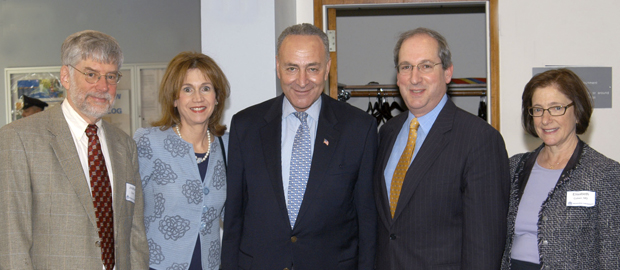Schumer says US must refocus on production
Inaugural Saul G. Cohen Memorial Lecture attracts 300 people

Jonathan Cohen, Kathy Lawrence, New York Sen. Charles Schumer, President Fred Lawrence and Elisabeth Cohen. The Cohens are children of the late science professor Saul G. Cohen, in whose memory they created the new lecture series.
New York Senator Charles Schumer told his audience at the inaugural Saul G. Cohen Memorial Lecture that the American dream is threatened unless the United States refocuses on production rather than consumption.
During a lecture and subsequent question-and-answer session largely devoid of partisan rhetoric, the veteran Democratic lawmaker said the country was facing difficult choices, but he was optimistic that America could solve its problems and retain its position as the world's leading economy.
"The reason our country [found itself] in such trouble was that we consumed more than we produced, borrowed more than we saved and imported more than we exported," Schumer told an overflow crowd at the Shapiro Campus Center Theater Friday, May 6. "We have to become a production giant again."
The Cohen Memorial Lecture is named for a longtime Brandeis science professor who died on April 24, 2010, at the age of 93. The annual lectureship series was established last year through the generosity of Cohen's family and friends, and is designed to reflect his wide variety of interests. Future lectures will feature leaders from the worlds of academia, arts, business and industry, government and politics, law and science.
After President Fred Lawrence welcomed attendees and Irv Epstein, the Henry F. Fischbach Professor of Chemistry, spoke about Cohen's contributions to both science and Brandeis, Schumer was introduced by Elisabeth Cohen, Saul's daughter.
Schumer told the crowd of 300 students, faculty, alumni and friends that for the United States to continue to grow its economy and reestablish its position as a leading producer of goods, the government needed to focus on six areas: education improvements, immigration policy reform, infrastructure investment, scientific research, tax code changes and business-friendly regulations.
The three-term senator called for increased teacher salaries and higher standards for K-12 education, while upping the number of grants available for college-bound students. "If we make it easier to pay for college, we will have more kids going to college," he said.
Schumer also said the country's immigration policy should be changed to allow foreign students to remain in the United States after they complete their educations. "It's absolutely absurd that the best and brightest want to come to our universities, and then we send them home to compete against us," he said.
Schumer told attendees that there was a direct correlation between infrastructure growth and economic growth. He also said that when government invests in scientific research, "it inevitably creates thousands of companies and millions of jobs."
Finally, he said the tax system must be reformed to encourage production over consumption, and outdated government regulations need to be relaxed to fuel growth.
Co-sponsors of Schumer's lecture included the College Democrats, Democrats for America, the Department of Community Service, the Heller School for Social Policy and Management, the Hiatt Career Center, the Waltham Group and the Gordon Center for American Public Policy.
Cohen achieved a number of firsts in his 36 years on the Brandeis faculty. He was the first chair of the chemistry department and the science school, the first dean of faculty and the first University Professor. He was instrumental in transforming Brandeis from a small liberal arts college to a first-rate college and research university with thriving graduate programs. Upon his retirement, he received an honorary degree from the University.
In the 1940s, Cohen, working alongside Edwin Land of the Polaroid Corp., developed the organic chemistry reactions needed to stabilize pictures and create instant film. He joined the Brandeis faculty in 1950.
Categories: International Affairs, Science and Technology






